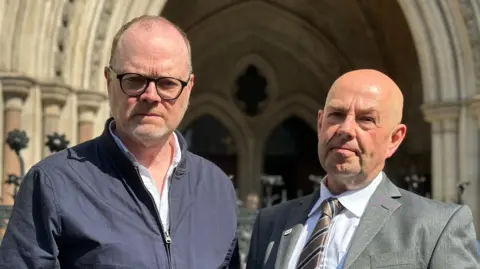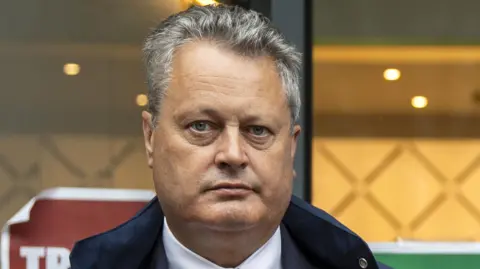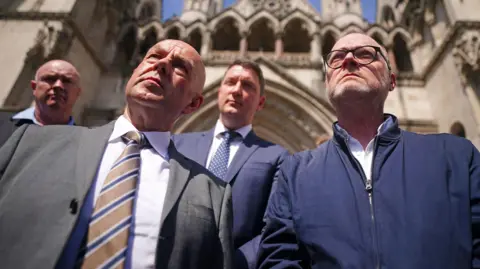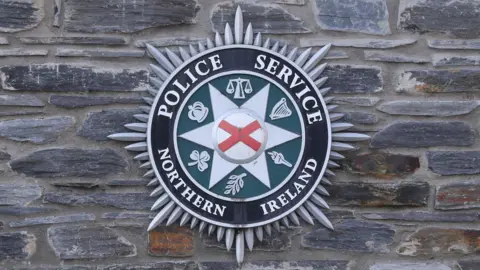PSNI's journalist surveillance: The story so far
 BBC
BBCSpying claims involving the police are gathering steam and a scandal is brewing.
A drip-drip of courtroom revelations has widened the pool of “troublemaker” journalists who have allegedly been subjected to covert phone surveillance.
It would appear this was routine practice - when it was ended, or if it even has, is not yet clear.
How did the PSNI's surveillance of journalists emerge?
In 2018, two journalists, Barry McCaffrey and Trevor Birney, were arrested in an operation led by Durham Constabulary who had been tasked by the Police Service of Northern Ireland (PSNI) to investigate how they obtained information for a documentary on the UVF Loughinisland massacre.
The following year, the pair won a court case which found the search warrants used had been “inappropriate”.
The judge said they had acted properly in protecting their sources in a lawful way and the police later paid damages amounting to £875,000.
The journalists then filed a case with the Investigatory Powers Tribunal (IPT) which examines complaints regarding covert surveillance and this has widened the story.
Which journalists were being surveilled?
Material has surfaced through legal disclosure which reveals details of surveillance against Mr McCaffrey, Mr Birney and other journalists.
It has emerged they were arrested in the hope of flushing out a source and that Mr McCaffrey was the subject of surveillance on multiple occasions, including in 2013 when his phone was accessed while he pursued allegations of police corruption.
Other documents prompted the BBC to go to the IPT about one of its former journalists, Vincent Kearney, who believes his phone was monitored while he made a programme in 2011 involving the Police Ombudsman’s Office.
This week – in perhaps the biggest development so far – a document came to light which stated eight journalists had their phone records checked as routine.
 PA
PAWhat document emerged in the tribunal process?
It is Durham Constabulary minutes of a meeting with PSNI officers in November 2017.
It states that the “unlawful disclosure” of police information had been a long-standing issue and that in 2007/2008 “telephone billing” may have been applied for in an attempt to establish who was leaking to journalists who were “always looking for a story”.
A PSNI officer is recorded as stating he is “proactive” in conducting “defensive operations” by cross-referencing billing with police telephone numbers every six months.
The minutes list the names of eight people, all redacted, which were run through a “stand alone intelligence system”.
The lawyer representing Mr McCaffrey and Mr Birney described the group as being viewed by the police as “troublemaker journalists”.
 PA
PAWas the surveillance of journalists lawful?
The journalists’ lawyer argues the police have acted unlawfully, but this, ultimately, is the matter to be determined by the IPT which has scheduled the case for full hearing in October.
There is legislation governing legitimate use of covert surveillance, but evidence around what procedures were properly followed has not yet come to light.
Importantly, as Mr McCaffrey has noted, the law prevents police from trying to identify journalists’ sources without good reason.
 PA
PAHow damaging is this for the PSNI?
It has created a barrage of negative headlines and raised significant issues the PSNI has not yet addressed substantively.
Based on documents, surveillance of multiple journalists appears to have taken place between 2007 and 2018, but it is not clear what the situation has been since.
A further issue is that Durham Constabulary are disclosing things to the IPT of which the PSNI seems, so far, to have provided no details.
Separately, it took the PSNI months for it to produce a report to the Policing Board which one member, Nuala McAllister, described as “utterly vague”.
The board asked how many journalists and lawyers had been subjected to surveillance.
It was told not more than ten in each category.
A board advisor has been granted access to PSNI material and is due to report next month on whether policies and procedures were correctly adhered to.
